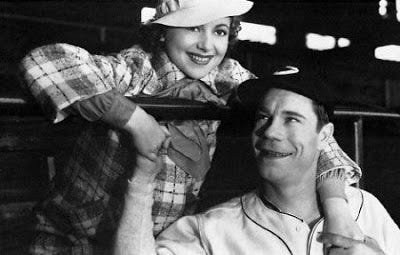Excuses Interfere with Romance in “Alibi Ike,” Starring Baseball Fan Joe E. Brown

One of three baseball movies by this lifelong sports fan was also the debut of a future Hollywood legend.
by Rich Watson
If Joe E. Brown is remembered by modern movie audiences, it’s for his scene-stealing turn in Some Like it Hot, the gender-bending comedy with Marilyn Monroe in which Brown seduces Jack Lemmon in drag. It’s Brown who utters that film’s famous last line, “Well, nobody’s perfect!”
Long before that career-redefining role, Brown was a headlining actor in a number of comedies from the thirties, in particular baseball films. One of those was a romantic comedy co-starring a young woman taking the first step on a long journey to superstardom: Olivia de Havilland.
From vaudeville to baseball to Hollywood
As a child, Brown toured with a circus tumbling act on the vaudeville circuit. His comedic flourishes got him noticed. Sports was another attraction for him, and as a baseball player, he played professionally for a time. He was good enough for the Yankees to offer him a contract, but he turned it down.
After spending the twenties on Broadway, the movies were next. He appeared in the 1929 color musical talkie On With the Show, and suddenly he was in demand.
Brown was distinctive for his unusually wide mouth, which he employed to great advantage. Caricatures and animated cartoons exaggerated it. Movie posters would show him either with a wide grin or yelling or even eating.
Brown made movies set in the worlds of football, boxing, wrestling, bicycling and polo, but he never forgot his love of baseball. In 1932, he starred in Fireman, Save My Child, where he plays a fireman who moonlights as a ballplayer. Then he made two more baseball films which adapted stories by one of America’s most notable sportswriters.
Ring Lardner and the movies
Michigan native Ring Lardner was a novelist, short story writer, playwright and poet but is perhaps best remembered as a sportswriter, particularly for baseball. In 1926 he wrote the screenplay for a silent baseball film called The New Klondike, set in the Florida minor leagues.
Three years later, his baseball play Elmer the Great was adapted into a film called Fast Company. In 1933, it was remade by First National Pictures under its original name, starring Brown.
“Alibi Ike” was the title of a Lardner story published by the Saturday Evening Post in 1915. Warner Brothers scooped up the film rights this time, pairing Brown with a nineteen-year-old girl fresh out of high school.
De Havilland the ingenue
Before Gone With the Wind, before The Heiress and The Adventures of Robin Hood and scores of other roles in film and television in a fifty-year-plus career, double Oscar-winner Dame Olivia de Havilland, who died last year at the astounding age of 104, was once nothing more than a community theater actress, born in Japan and raised in Santa Clara County, California.
Discovered in a local stage production of A Midsummer Night’s Dream, de Havilland was offered an understudy role in a bigger performance of the Shakespeare play at the Hollywood Bowl. When the lead for the part of Hermia dropped out, de Havilland stepped in.
In 1934, Warners signed her for a cinematic version of the play. It would be the first film de Havilland made (Brown also appeared in it), but Alibi Ike was the first film of hers to be released. Both films came out in 1935.
Brown lifts Cubs to a pennant in ‘Ike’
They call rookie pitcher Frank Farrell “Alibi Ike” because he always has an excuse for every dubious act he commits. He’s the key to a winning Cubs team, however, one that, in their drive to the World Series, attracts the attention of gamblers.
Along the way he falls for the manager’s sister-in-law Dolly, played by de Havilland. The blog Old Hollywood Films reports that de Havilland initially wasn’t crazy about the role:
...Olivia wasn’t happy about her casting, according to her biographer, Victoria Amador. She wanted to be a serious actress in top-quality films, and she didn’t think appearing as a naive love interest in a roustabout baseball comedy was the best way to advance her career. “I began this career in the most illustrious terms—with Shakespeare—and I had quite other ideas about my own career,” she said.
Brown portrays Frank as basically a decent person, despite his lies. De Havilland catches Brown denying the fact of their engagement to his teammates and this, naturally, leads to her breaking off their wedding.
The blog Mondo 70, in its review of Ike, goes so far as to suggest Frank’s lies are pathological:
...He “alibis” constantly, going beyond what we think of the word today. He doesn’t just make excuses for himself but feels compelled to make shit up even when he needs no excuses. He seems incapable of candor, as if to admit any truth about himself, to confirm anyone else’s perception of him, is to leave himself vulnerable.
Still, all works out fine in the end. Look for future I Love Lucy co-star William Frawley as the manager.
Ike also has cameos by a number of actual ballplayers, including former Giant and former Olympic gold medalist and pro footballer Jim Thorpe.
Brown’s son goes into baseball management
Brown had four children with wife Kathryn McGraw, one of whom, Joe L. Brown, went on to become the Pirates’ general manager. His teams won the World Series in 1960 and 1971. MLB.com has a nice profile on him.
————————
Have you seen any of Joe E. Brown’s films?


